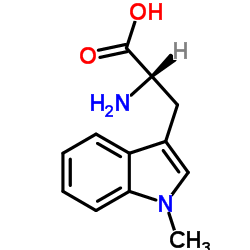(S)-Indoximod

(S)-Indoximod structure
|
Common Name | (S)-Indoximod | ||
|---|---|---|---|---|
| CAS Number | 21339-55-9 | Molecular Weight | 218.252 | |
| Density | 1.28 | Boiling Point | 429.3±35.0 °C at 760 mmHg | |
| Molecular Formula | C12H14N2O2 | Melting Point | 223-226 ºC | |
| MSDS | Chinese USA | Flash Point | 213.4±25.9 °C | |
|
Human renal tubular epithelial cells suppress alloreactive T cell proliferation.
Clin. Exp. Immunol. 179(3) , 509-19, (2015) Renal tubular epithelial cells (TECs) are one of the main targets of alloreactive T cells during acute rejection. We hypothesize that TECs modulate the outcome of alloimmunity by executing immunosuppressive effects in order to dampen the local inflammation. W... |
|
|
Induction of indoleamine 2,3-dioxygenase (IDO) enzymatic activity contributes to interferon-gamma induced apoptosis and death receptor 5 expression in human non-small cell lung cancer cells.
Asian Pac. J. Cancer Prev. 15(18) , 7995-8001, (2014) Interferon-gamma (IFN-γ) has been used to treat various malignant tumors. However, the molecular mechanisms underlying the direct anti-proliferative activity of IFN-γ are poorly understood. In the present study, we examined the in vitro antitumor activity of ... |
|
|
Interferon gamma-mediated BoHV-4 replication restriction in bovine endometrial stromal cells is host IDO1 gene expression independent and BoHV-4 IE2 gene expression dependent.
Biol. Reprod. 91(5) , 112, (2014) In the present work the interaction between bovine herpesvirus 4 (BoHV-4)-infected bovine endometrial stromal cells (BESCs) and interferon gamma (IFNG) was investigated. Starting from the particular tropism of BoHV-4 toward BESCs, a pure population of these c... |
|
|
Licensing by Inflammatory Cytokines Abolishes Heterogeneity of Immunosuppressive Function of Mesenchymal Stem Cell Population.
Stem Cells Dev. 24 , 2171-80, (2015) When mesenchymal stem cells (MSCs) are used for therapy of immunological pathologies, they get into an inflammatory environment, altering the effectiveness of the treatment. To establish the impact of environmental inflammatory factors on MSCs' immunofunction... |
|
|
Mesenchymal stem cells are enriched in head neck squamous cell carcinoma, correlates with tumour size and inhibit T-cell proliferation.
Br. J. Cancer 112(4) , 745-54, (2015) Cancer is a multifactorial disease not only restricted to transformed epithelium, but also involving cells of the immune system and cells of mesenchymal origin, particularly mesenchymal stem cells (MSCs). Mesenchymal stem cells contribute to blood- and lymph-... |
|
|
The Mechanisms of Human Renal Epithelial Cell Modulation of Autologous Dendritic Cell Phenotype and Function.
PLoS ONE 10 , e0134688, (2015) Proximal tubule epithelial cells (PTEC) of the kidney line the proximal tubule downstream of the glomerulus and play a major role in the re-absorption of small molecular weight proteins that may pass through the glomerular filtration process. In the perturbed... |
|
|
Amino acid metabolism inhibits antibody-driven kidney injury by inducing autophagy.
J. Immunol. 194 , 5713-24, (2015) Inflammatory kidney disease is a major clinical problem that can result in end-stage renal failure. In this article, we show that Ab-mediated inflammatory kidney injury and renal disease in a mouse nephrotoxic serum nephritis model was inhibited by amino acid... |
|
|
Trypanosoma cruzi evades the protective role of interferon-gamma-signaling in parasite-infected cells.
PLoS ONE 9(10) , e110512, (2014) The protozoan parasite Trypanosoma cruzi is responsible for the zoonotic Chagas disease, a chronic and systemic infection in humans and warm-blooded animals typically leading to progressive dilated cardiomyopathy and gastrointestinal manifestations. In the pr... |
|
|
Indoleamine 2,3-Dioxygenase Is Involved in the Inflammation Response of Corneal Epithelial Cells to Aspergillus fumigatus Infections.
PLoS ONE 10 , e0137423, (2015) Indoleamine 2,3-dioxygenase (IDO), which is mainly expressed in activated dendritic cells, is known as a regulator of immune responses. However, the role of IDO in immune responses against fungal corneal infection has not been investigated. To evaluate the re... |
|
|
Mutual interaction between human multipotent adult progenitor cells and NK cells.
Cell. Transplant. 23(9) , 1099-110, (2014) Human multipotent adult progenitor cells (hMAPCs) are isolated from bone marrow with a more extensive expansion capacity compared to human mesenchymal stem cells (hMSCs) and with the ability to differentiate into endothelium. Like hMSCs, hMAPCs inhibit T-cell... |